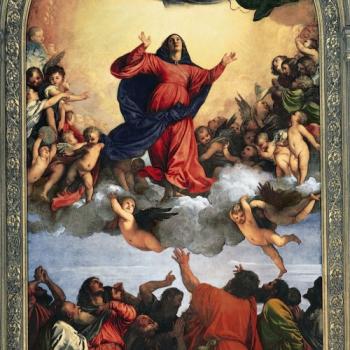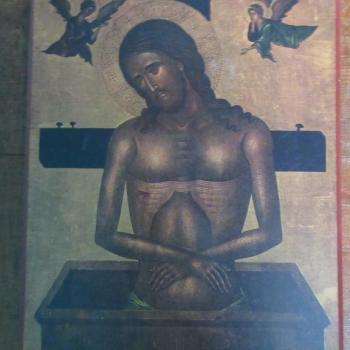Fr. Sergius Bulgakov was one of the most important Orthodox thinkers of the 20th century. Yes, his works often received criticism by his peers, but on the other hand, he also earned their respect even in disagreements. At his funeral, Metropolitan Evlog gave him great praise, saying:
You were a Christian sage, a teacher of the Church in the purest and most lofty sense. You were enlightened by the Holy Spirit, the Spirit of Wisdom, the Spirit of Understanding, the Comforter to Whom you dedicated your scholarly work. He transformed the Saul in you into Paul.
He was ecumenical in spirit, but he did not allow his ecumenism to override his beliefs: he did not think any ecumenical discussion could be had without a discussion of the Theotokos and the eucharist.
While he put his priestly role first, what he will be most remembered for are his theological writings, with two “trilogies” representing the height of his thought: the so-called lesser trilogy: The Burning Bush on Mary, The Friend of the Bridegroom on St John the Baptist and Jacob’s Ladder on Angels; and his so-called greater trilogy: The Lamb of God on Christology, The Comforter on the Holy Spirit, and The Bride of the Lamb on Ecclesiology and Eschatology. Now that Jacob’s Ladder has been translated into English, I would like to provide my own ranking of these books, and offer some brief discussions on each one, hopefully explaining why I put them as I did on this list.
6. The Friend of the Bridegroom. It is rather difficult to write a theological tract on St John the Baptist, and though Bulgakov did an excellent job, the fact that there is little to work with on the Baptist makes this book a bit of a disappointment. It is not that the book is not good, but it is not as meaty as most of his works. Bulgakov does offer interesting insights into the man, and the work does help us understand his traditional placement of John on the Deisis. John, according to Bulgakov, has found himself in the rank of angels, indeed, having not only human nature, but an angelic one as well. Though a very interesting notion, more work needs to be said and done to understand what this really means.
5. The Comforter. Like St John the Baptist, the Holy Spirit is difficult to assess. St Basil famously discussed how early theology only indirectly discussed the Holy Spirit, and he had to use such indirect evidence to lead his audience to understanding the Holy Spirit, the “unwritten God,” as not only being God, but a divine person. Bulgakov’s work shows his ecumenical intent; he provides one of the best discussions on the filioque controversy, showing how many people who debate the procession of the Spirit are talking past one another. He explains how the Spirit must always be understood as being connected with the Son, and this is the proper way to understand the “and” of the filioque. Bulgakov’s understanding of the Son and Spirit as being the positive source for gender distinctions is important, though done better elsewhere.
4. The Burning Bush. Once again, Bulgakov has an ecumenical intent with this work, but he also desired to defend Orthodox criticism of the Immaculate Conception as he confirms what he believes is the proper interpretation of Mary’s sinlessness. Because of this, he does not satisfy anyone: some Orthodox believed this work to be heretical because they thought he gave in too much to the Vatican, while Catholics like myself think he often contradicts himself as he tries to defend the Orthodox rejection of the Vatican’s declaration of the Immaculate Conception. While he points out that the effects of original sin can be seen influencing Mary, because she died, there are many ways to interpret this: after all, no one would say Jesus had original sin even though he died. Tradition says that she willingly died to follow the example of her son and his humility. When not dealing with this problem, however, he provides some of the most beautiful descriptions of Mary, making this book well worth reading. It is when he is not mindful of the Vatican Doctrine of the Immaculate Conception, when he is engaging the greatness of the Theotokos, we find words which, if reflected upon further, should render his opposition to the Vatican doctrine impotent.
3. The Lamb of God. Bulgakov provides a very sound Christology, and explains quite well why Christology must be a Sophiology. He explores the history of Christology, showing not only difficulties theologians have had to address, but also how his Sophiology helps deal with them. He tries to also explain some of the misunderstandings of Christology in the past, such as we find in his discussion on Apollinaris, where he points out that Apollinaris raised many of the right questions but did not know how to properly answer them. In this way, he says we should be willing to give Apollinaris more mercy than often is given to him by later dogmatic writers. This alone makes Bulgakov’s Christology important, because it helps us move beyond a purely dogmatic presentation of history, where those who erred are automatically denounced without sympathy. Indeed, one can learn from the mistakes of others, seeing what good they offer; error does not have to be seen as “total.” This is something we should remember when we dialogue with each other: people can make mistakes, and we should work with them through their mistakes when we can instead of demonizing them, for when we demonize them, they are more likely to hold fast to where they are.
2. Jacob’s Ladder. I’m not normally a fan of books on angels. Most of them end up being filled with all kinds of “fluff.” For this reason, I didn’t expect to like this book as much as I did. However, I found this to be one of the most theologically and philosophically solid examination on angels and the angelic world I’ve ever read. Bulgakov’s key point is that the angelic and human worlds are interconnected. We are given guardian angels as friends and co-workers, united with us not only in our vocation, but also in the way we hypostasize Sophia. Bulgakov explains how the angels represent the higher metaphysical principles which Plato understood to be the Divine Forms. This allows for a significant discussion on angels, on the way they too are deified, and how, as they have been a role in guiding and directing material creation, their role in the world was at once intuitively understood and misunderstood by pre-Christian man as “gods.” His discussion of the angelic choirs, about their music and beauty, is connects to the world emphasized some of the same conclusions I had come to before I read it through my reading of Tolkien. Finally, his take on fallen angels allows us to understand them even better; we can see how they used their authority and abused it: they are the “demons” who wanted to rule the world, to use it for their own ends instead of as service for God. Thus, they took on the role of “gods” and acted as tyrants over humanity: the brutality we see in the pre-Christian theogonies can be attributed to them. This book offers a great, and fresh, cosmological and metaphysical perspective which is needed in the world today.
1. The Bride of the Lamb. While Bulgakov died while writing and polishing this work, it is his magnum opus. His Sophiology reaches its most mature point: what is hinted at or discussed elsewhere is brought up again here once again, but with more theological and philosophical force. In it, one gets a good overview of his theology. It is not that the other works are made superfluous: far from it; they are complemented by what is brought together in here instead of rendered obsolete. Nonetheless, we must understand, this is not an easy work to read. We find him at the height of his metaphysical and theological explorations: his closeness to death, perhaps, allowing for even greater insights because death allows us to have a greatest grasp of the spiritual realm. When he is engaging metaphysics, much of what we get are subtle philosophical and theological debates; one does not have to understand all the details to get his point, but the details are necessary to defend them. His criticisms on “Thomism” are a prime example of this: he hits fast and hard, and with subtleties which will take considerable time to examine before one can reach a conclusion on Bulgakov’s points. Even when he is engaging his own theological opinions, the subtle nuances he gives us can give people headaches, and yet one cannot but feel the effort to understand his views leads to a better understanding of our Christian faith. His attempt to understand original sin and history is creative, and I believe, on to some striking insights, but they are left as a diamond in the rough. His ideas need to be explored further, developed, and possibly have aspects of them purified of any possible error; it is a task I hope many will take up now that his works are becoming known in the English speaking parts of the world. His eschatology is an important contribution to the theme; the sources of his thought clearly are patristic, with St Gregory of Nyssa and St Isaac the Syrian being his starting point; he reengages them, bringing out difficulties which had been ignored for centuries. Balthasar would take on many of these same themes, but because Bulgakov’s audience was different, I think Bulgakov was far more direct, and the general reader will come out of his work understanding Bulgakov’s point far easier than with Balthasar. The only sad thing about the English edition of The Bride of the Lamb is that Bulgakov’s appendix, “Apocatastasis and Transfiguration,” previously translated, was not put into this work and will have to be bought separately.












